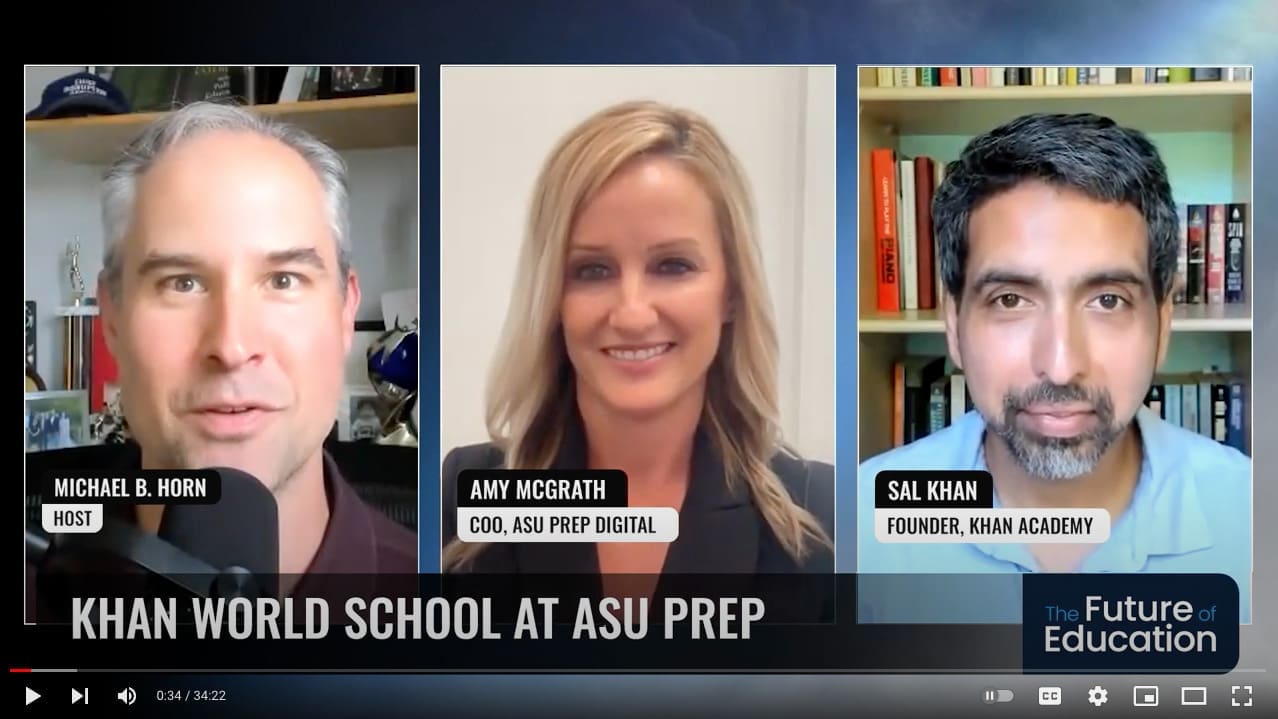Making the case for a personalized K-12 virtual education.
One year after its inception, Khan World School and ASU Prep Digital have seen dramatic success with its digital classroom model and personalized education curriculum. The platform’s commitment to providing quality education to everyone, regardless of location or economic background, has made a significant difference in the lives of students worldwide, including its first class of 47 ninth-grade students.
“This was a bit of an experiment to see if it threads the needle in the right way,” said Sal Khan, founder of Khan Academy. “I think we’ve hit the sweet spot where the average student is spending about two hours of synchronous time with their community. But those two hours, I would argue, are more connected than the five or six hours that a lot of students might spend in a traditional classroom.”
The final end-of-year results were surprising, even to Khan.
“We’ve seen two to three times growth in math, we’re looking at three to three plus times expected growth in reading … language arts, I don’t even want to say it because it’s so large, five times expected growth.”
Both Khan and Amy McGrath with ASU Prep Digital see new opportunities for innovation in online education, like online college prep and online honors programs, to help increase engagement and motivate homeschool students. Within the next year, they plan to expand their online offerings to nearly 350 students in grades 6-12 around the world.
“Increasing opportunity is what Arizona State University is all about,” said McGrath. “Being able to partner with someone as prolific as Sal to design a model that is giving students a hybrid, flexible choice and allowing them to sprint is so exciting.”
Defying the Myth of K-12 Virtual Education
After the pandemic took students out of the traditional classroom setting, Khan saw virtual classrooms as an opportunity to help them get the best of both worlds through what he calls “mastery learning.” This idea breaks with the traditional classroom approach and combines independent studies with interactive online learning, allowing their students to create a foundation for themselves.
“There are students today who want to be challenged … these are going to be the kids who start the Googles of the future, who cure diseases, write the great novels of the future,” said Khan. “Even if we can reach thousands of them, I think that’s going to have a huge impact on society … [and it] sets an example of what’s possible in the broader world.”
“They’re not necessarily coming in as crazy high-aptitude learners,” added McGrath. “They’re just willing.”
Through their small group-based education system known as “houses,” the first group of students at Khan World School had the unique opportunity to engage with peers at a micro level.
“Fifty really is a small community of learners. We then shrink that even more and have smaller houses where they get to know each other on a more personal basis … [and] work on peer mastery,” said McGrath. “They also have the opportunity to get together in the Socratic seminar sessions that have all 50 of the students … a resounding theme is respect for one another and for different opinions, and the desire to grow and expand their thinking.”
With its adaptive learning technology and data-driven insights, Khan World School continues to innovate and refine its offerings so it can stay ahead of the next big shift in K-12 virtual education.
A Universe of Assets with AI
While there’s still much to learn about artificial intelligence (AI) and how it can affect our day-to-day lives, Khan doesn’t see its emergence in education as an obstacle. In fact, he sees it as a new opportunity. His flagship institution, Khan Lab School, tested the precision and effectiveness of AI in education– and the results are very promising.
“Artificial intelligence can do higher-order tasks, even in math, that we couldn’t traditionally do,” said Khan. “Artificial intelligence can work with the student, but also assess the student and communicate with the adults on what the adults can do to better support the students.”
From tutoring and teaching to lesson planning and critical problem solving. In the words of McGrath, AI brings a “universe of assets” to education. And as Khan World School looks to the future, the integration of online resources and AI with traditional education holds great promise in changing the way students learn, and teachers instruct.
“Khan World school is going to be the epicenter of not just throwing technology in there just to look modern, but to do it in ways that are really thoughtful where we can start to do even more mastery-based learning,” said Khan. “With all of the artificial intelligence work that’s happening, we need to show the world how this can be used for good.”

